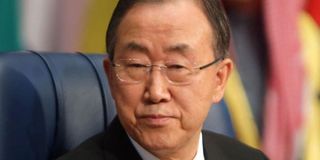60 killed in Iraq convoy attack as UN chief visits

United Nations Secretary-General Ban Ki-moon. An onslaught on a convoy transferring inmates north of Baghdad left dozens dead Thursday, as the visiting UN chief said Iraq’s survival hinged on a more inclusive government. PHOTO | AFP
What you need to know:
- One security source said the inmates were being transferred as a precautionary measure after Taji prison was hit by mortar fire on Wednesday.
- Among the allegations are that members of the Iraqi security forces shot prisoners, on the grounds they were sympathetic to advancing forces from the Islamic State (IS) jihadist group, that jails were set on fire and that grenades were tossed into cells.
BAGHDAD
An onslaught on a convoy transferring inmates north of Baghdad left dozens dead Thursday, as visiting UN chief Ban Ki-moon said Iraq’s survival hinged on a more inclusive government.
Most of the 60 killed in the spectacular pre-dawn ambush were prisoners convicted of terrorism charges being transferred from Taji prison, barely 25 kilometres north of the capital.
Explosions from the attack were heard in some neighbourhoods of Baghdad, where UN chief Ban Ki-moon landed Thursday on an unscheduled stop in his Middle East tour.
“At least 60 people, prisoners and policemen, were killed in a suicide attack followed by several IEDs (improvised explosive devices) and shooting,” an interior ministry official told AFP.
One security source said the inmates were being transferred as a precautionary measure after Taji prison was hit by mortar fire on Wednesday.
The exact circumstances of Thursday’s attack were not immediately clear, nor how many attackers were dead or how the prisoners they were apparently trying to free were killed. The bus was believed to be transporting around 60 prisoners, and medics said 54 of those killed in the attack were inmates.
Most of the bodies were burnt beyond recognition, they said. Government forces were recently accused by rights watchdogs of having executed more than 250 prisoners since June 9.
Among the allegations are that members of the Iraqi security forces shot prisoners, on the grounds they were sympathetic to advancing forces from the Islamic State (IS) jihadist group, that jails were set on fire and that grenades were tossed into cells.
FACING PRESSURE
Prime Minister Nuri al-Maliki’s alliance comfortably won elections in April but he has faced mounting domestic and foreign pressure to step aside since the flare-up.
The Shiite premier has accused the Sunni mainstream of condoning the IS offensive and “dancing in the blood” of the onslaught’s victims.
But many retort it was Maliki’s own brand of sectarian politics that brought the country to the brink of collapse.
“Iraq is facing an existential threat but it can be overcome by the formation of a thoroughly inclusive government,” Mr Ban said at a joint news conference with Maliki.
Meanwhile, Kurdish politician Fuad Masum became the new president of Iraq today, in a step towards forming a new government that Mr Ban said must be inclusive for the country to survive.
In another development, Jihadists in Iraq have ordered that all women between the ages of 11 and 46 must undergo female genital mutilation, which could affect up to four million women and girls in the war-ravaged country, a UN official said Thursday. The UN’s second most senior official in Iraq, Jacqueline Badcock, said, “It is a fatwa (or religious edict) from ISIS, we learnt about it this morning.’’





